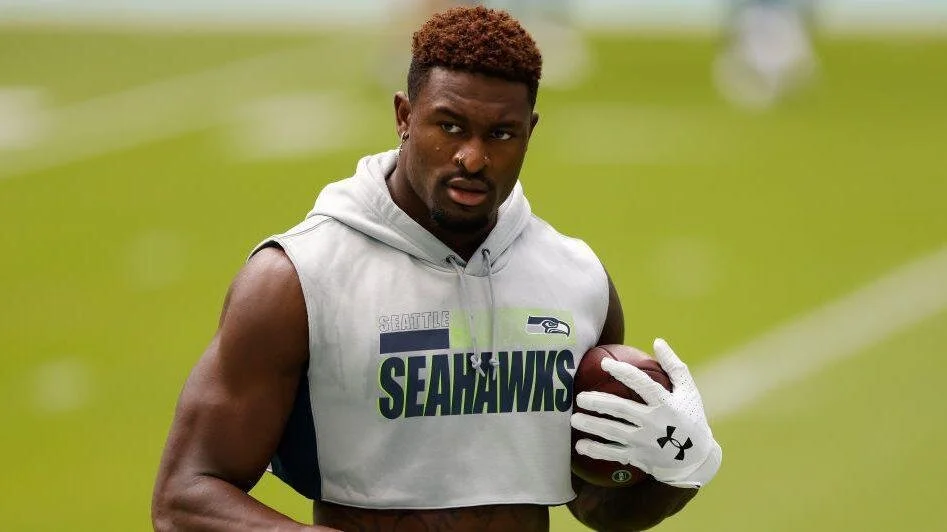Is it better to be THE best or YOUR best?
DK Metcalf may not have been THE best during a race against Olympic hopefuls on Sunday, but we can all learn some valuable lessons from his effort. — Associated Press photo
Is it better to be THE best or YOUR best?
I’ve been thinking a lot about that question lately, especially since Sunday afternoon. That’s when I saw some footage of DeKaylin Zecharius Metcalf. If you don’t know the name, don’t feel bad. I didn’t either until I looked it up.
I’ve only known him as DK Metcalf, the scintillating wide receiver for the Seattle Seahawks. If you still don’t know who I’m talking about, there’s a good chance you saw this video of him circulating last fall. It’s likely the most memorable moment of the 2020 NFL season.
Yes, THAT DK Metcalf. The linebacker’s body with a sprinter’s speed. Superman in shoulder pads.
Last weekend, Metcalf competed against several Olympic hopefuls in the 100-meter dash at the USA Track and Field Golden Games.
He finished last in his heat. Dead last.
"Personally, it was a good experience," Metcalf said to reporters after the race. "Anybody else who has a different opinion, you're entitled to your own opinion. But I think I did well for myself."
Some might call that rationalizing. After all, Metcalf had a few built-in excuses for where he finished. He had at least three inches and nearly 80 pounds on each of the competitors. And while the sprinters he faced train year-round for those races, Metcalf is busy with some other things each fall and winter. In fact, he hadn't competed at a track meet since high school and on Sunday he ran what he described as his first 100-meter race.
So, no, he wasn’t THE best. But he was HIS best. A time of 10.35 is smokin’.
Is it better to be THE best or YOUR best?
Did Metcalf prepare himself well? Check.
Did he run his hardest? Check.
Did he push the potential Olympians to expend every ounce of energy to beat him to the tape? Check.
Did he leave the track feeling good about his effort? Check.
About the only thing Metcalf didn’t do was finish first. That’s a pretty solid day by anyone’s standards.
But let’s flip it around for a moment. Let’s say Metcalf DID win the race. But under these circumstances.
Two runners were disqualified for false starts.
Another potential Olympian pulled up lame with a hamstring.
The top qualifier ran his slowest time of the year.
So Metcalf broke the tape with a 10.55 and took the gold.
Is it better to be THE best or YOUR best?
Metcalf’s story reminded me of another I read about some years ago. This one also took place on a track-and-field oval in Seattle, coincidentally enough. Here’s what went down, as excerpted in the book, “The Revolution Within,” by Dwight Edwards.
The incident happened during the Special Olympics, a competition for physically and mentally disabled children. The hundred-yard dash had nine entrants. The gun sounded and the runners sped out of the blocks.
But just a dozen or so yards into the race, one little boy tripped, fell on the track and began to sob. The other eight competitors heard his cry and they all stopped and turned around to find out what had happened. Seeing him on the ground, they all walked back to him — every one of them.
One little girl with Down Syndrome bent down, kissed his leg, and said, “This will make it better.”
Then they all wrapped their arms around one another and walked together to the finish line. Everyone in the stadium stood and applauded. The cheers continued for several minutes. Those who witnessed the event still talk about it today.
One by one, the children returned to “make it better” for the boy.
And in turn, they brought out the best in each other.
Is it better to be THE best or YOUR best?
Did you know the word compete is derived from the Latin “competere,” which means to “strive in common, strive after something in company with or together.”
Here’s how I read that: We engage in competitive endeavors to bring out the BEST in each other. That means:
•We try our hardest.
•We push our opponents to their maximum effort.
•We relish the gift of being able to use our bodies and minds in that way.
•We thank our opponent for exposing our skill deficiencies, our character flaws and inability to focus at times.
We then return to our training regimen so we can improve in each of those areas. And during the next match, game, race or business meeting, we are better for it.
Maybe not always THE best.
But OUR best can be pretty damn good.
Sometimes, it might even mean winning.
(Tim Kolodziej is the author of this piece and founder of EnspireU.com. When he’s not behind a laptop, he can be found inside a gym helping young athletes create their own unique future — one rep at a time. Click here to connect with him by email.)
